- Home
- Dan Millman
SACRED JOURNEY OF THE PEACEFUL WARRIOR Page 6
SACRED JOURNEY OF THE PEACEFUL WARRIOR Read online
Page 6
“I heard you call to me.”
“I didn’t call you.”
“Yes, you did.”
“No, I didn’t. I was going to, but—”
“Then how did I know you were here?”
“I asked you that!”
“Then I guess we’ve come full circle,” she said. “Sit down; I brought lunch.”
At the word “lunch,” I obeyed promptly, sitting on a thick carpet of damp leaves in the shade of a tree. My stomach growled as she offered me sumptuous yams—the best I’d ever tasted—specially prepared rice, and an assortment of crisp vegetables. I don’t know how she got it all into her backpack.
The conversation died while we concentrated on eating; finally, between bites, I said, “Thanks. You really know how to cook.”
“I didn’t make it,” she said. “Sachi did.”
“Sachiko? Who taught her to cook like that?” I asked.
“Her father.”
“She’s quite a talent. Her parents must be proud of her.”
“They are more than proud of her.” Mama Chia put down her food and gazed past the clearing into the thick emerald forest. “Let me tell you a true story: Nine years ago, I helped bring Sachi into the world. When she was four, I also welcomed her little brother.
“Soon after her brother was born, little Sachi began to ask her parents to leave her alone with the new baby. They worried that, like most four-year-olds, she might feel jealous and want to hit or shake him, so they said no. But she showed no signs of jealousy at all; she treated the baby with kindness—and her pleas to be left alone with him became more urgent. They decided to allow it.
“Elated, she went into the baby’s room and shut the door, but it opened a crack—enough for her curious parents to peek in and listen. They saw little Sachi walk quietly up to her baby brother, put her face close to his, and say quietly, ‘Baby, tell me what God feels like. I’m starting to forget.’”
“She said that?” I asked, in awe.
“Yes.”
After a long pause, I remarked, “I can understand why she’s your apprentice.”
We sat in silence a while, in the shade of a tree, until Mama Chia said, “Tomorrow we go for a hike.”
“Together?” I asked.
“No,” she teased. “You’ll take the high road, and I’ll take the low road.”
I still didn’t know Mama Chia very well, and it was sometimes hard to tell whether she was joking. Seeing my confusion, Mama Chia laughed, and said, “Yes, we’ll hike together.”
I had a feeling things were about to pick up. Then I looked down at my worn trunks, and bare feet and chest. I looked up at her and explained, “I don’t know if I can hike far without—”
Smiling, she pointed behind me. “Look behind the tree.”
“My backpack!” I cried, amazed. As she grinned, I ran over to it and looked inside. My wallet—with a few dollars cash and credit card—my watch, a clean pair of shorts, my sneakers, toothbrush, and razor—everything was there.
“Sachi’s father was working on a carpentry job on Oahu,” she explained. “I sent him to Makapuu Point to find your things. He said you’d hidden them well.”
“When can I meet him and thank him?” I asked.
“He’s looking forward to meeting you, too, but he had to go back to Oahu to finish the job; he’ll return in a few weeks. I’m glad you have new shorts,” she added, holding her nose with one hand and pointing to my ragged trunks with the other, “so you can wash those.”
Smiling, I took her hand. “Thank you, Mama Chia. I’m really grateful for all you’ve done.”
“Yes, I’ve certainly done a lot,” she said, brushing off my thanks with a wave of her hand. “Have you heard about the new breed of dog that’s a cross between a pit bull and a collie? First it takes your arm off, then it runs for help.” She smiled. “I’ve already done enough damage; this is my way of ‘running for help.’”
Packing the remains of our lunch, she stood. I started to stand, too, but I was so weak I could barely get up. “I feel like such a wimp.” I said as she walked me back into the cabin.
“Your muscles only feel weak because your body is using the energy to heal the rest of you. You’ve been through a great deal; most people would have given up and died. Your Basic Self is very strong.”
“My basic what?” I asked, puzzled, as I sat down on the bed.
“Your Basic Self,” Mama Chia replied. “A part of who you are—an awareness separate from your conscious mind. Didn’t Socrates teach you about the three selves?”
“No,” I replied, intrigued. “But it sounds like an interesting concept.”
Mama Chia stood, walked to the window, and gazed outside. “The three selves are much more than a concept, Dan; they are as real to me as the earth, the trees, the sky, and the sea.”
Mama Chia sat against the windowsill and said, “A few hundred years ago, before the invention of the microscope, almost no one believed in the existence of bacteria and viruses, and so, humanity remained powerless before these unseen invaders. Those who did believe in their existence were labeled ‘crackpots.’
“I, too, work with elements invisible to most people—with nature spirits and subtle energies. But ‘invisible’ is not the same as imaginary, Dan. Each new generation forgets this, and so the cycle repeats itself—the blind leading the blind,” she said without a trace of rancor. “Ignorance, as well as wisdom, is handed down from one generation to the next like a precious heirloom.
“The three selves—the Basic Self, Conscious Self, and Higher Self—are part of a secret teaching. The secrets have never been hidden, really, but few people are interested, and fewer still have the eyes to see.”
She paced, in her limping style, across the room to the doorway, and turned back toward me. “When I speak to you of ‘invisible things,’ know that they are not invisible to me. But what is true for me does not have to be true for you; I’m not telling you what to believe—only sharing my experience.” She poured a glass of water and handed it to me. “When you’re strong enough—if Socrates has prepared you well—I’ll be able to take you to the edge, and point the way; all you’ll have to do is open your eyes and leap.” She walked to the door and said, “Now rest.”
“Wait,” I said, sitting up. “Before you go, can you tell me a little more about the three selves? I’d like to hear more—”
“And there’s more I’d like to tell you,” she interrupted. “But first you need to sleep.”
“I am tired,” I said, yawning.
“Yes. Tomorrow we’ll walk, and tomorrow we’ll talk.” Through the open doorway, I watched her swinging her cane and limping back into the forest. I yawned again, then my eyes shut and the world went black.
BOOK TWO
Illuminations
The real voyage of discovery consists
not in seeking new landscapes,
but in having new eyes.
—Marcel Proust
CHAPTER 7
The Three Selves
You cannot transcend what you do not know.
To go beyond yourself, you must know yourself.
—Sri Nisargadatta Maharaj
THE NEXT DAY, THE BIRDS’ SONG seemed sweeter and the world more beautiful. My strength was returning; only a few scabs remained. Running my hand across my two-week growth of beard, I decided I would keep it for now.
After filling up on tropical fruit and home-baked bread that had mysteriously appeared on my chest of drawers—another gift from Sachi, I guessed—I stepped outside, stripped naked, and showered in a warm, drenching downpour. The rain passed as quickly as it had come, leaving clear, sunny skies.
I had just finished combing my wet hair and smoothing on a thick layer of sunscreen when Mama Chia came limping down the path with her familiar backpack, cane, and a large muumuu dress—her typical hiking outfit, I learned.
After a brief greeting, she led me down a narrow, winding path toward the sea. As she lum
bered along the slippery trail, a few feet ahead of me, I could see it wasn’t easy for her to get around and was struck by her determination.
She stopped a few times—once, to point out a colorful bird, another time to show me a small waterfall and pond, hidden from the casual eye. After we sat a while, listening to the sounds of water falling into a pond, I offered to carry her backpack for her, but she refused, saying, “Maybe next time.”
Conversation was sparse after that. We both had to concentrate on our footing along the perennially muddy trail, crisscrossed by tree roots.
Finally, we made our way down a steep ravine and emerged into a small sandy clearing, one of the few beach areas among the rocky cliffs. On either side of us, lava rock shot straight up into the sky to form the towering cliffs.
Mama Chia took a light blanket out of her pack and spread it on the beach. The tide had just gone out, leaving the sand smooth, hard, and wet. The relaxing sea breeze felt good on my face and chest.
“Mama Chia,” I asked, “maybe it’s my imagination, but I’ve only been here about ten days—is that right?”
“Yes.”
“And didn’t I nearly die of exposure and thirst?”
“Yes,” she answered again.
“Well, aren’t I healing awfully fast?”
She nodded. “I’ve been working with you at night.”
“What do you mean?”
“When you sleep, your Conscious Self steps back; that’s when I can work directly with the Basic Self—your subconscious—which is in charge of healing your body.”
“You were going to tell me more about this ‘Basic Self.’”
Mama Chia stared at me, as if considering something. Then she picked up a nearby twig and drew a circle in the sand. “Better to show than tell,” she said, scratching the figure of a human body within the circle, his arms outstretched—a crude rendition of Leonardo da Vinci’s famous drawing.
Without further comment, she sat down on a mound of sand, crossed her legs, and said, “I need to do some inner work to recharge my batteries. Unless you’ve learned to do the same, I suggest you take a nap. Perhaps later we can talk.”
“But—”
With one breath, Mama Chia seemed instantly to go into a deep trance. I watched her for a few moments, then my attention turned once again to her drawing in the sand. Feeling suddenly drowsy on this sultry day, glad for the shade of the sheltering cliffs, I stretched out on the blanket and closed my eyes.
My thoughts turned to my wife and daughter, back in Ohio—light-years away, it seemed, from this hidden cove, where I rested a few feet away from a woman shaman whose full powers were yet to be revealed, and whose existence had been unknown to me a few weeks before. And I had found her, against all odds, against all hope.
Life is amazing, I thought. And the next moment, I fell headlong into a dreamlike vision.
I WAS ASLEEP, YET WIDE AWAKE. Mama Chia’s smiling face flashed before me, then vanished. In the blackness that followed, a human form appeared: a man’s body within a circle, his arms outstretched—not the figure Mama Chia had sketched in the sand, but a vivid image of da Vinci’s original.
Then, in the blink of an eye, I saw my own body appear within the circle, and it started spinning, cartwheeling through space.
From my point of awareness, I saw my physical form come to rest, standing upright in a forest, under a starry sky. Illuminated by the pale moon, clothed only in a pair of shorts, the figure stood with arms open wide, as if to embrace life itself, with head tilting slightly up and to the left, gazing up through the trees at the stars sparkling in the black velvet sky. I could see all this in the sharpest detail—every moon shadow on every leaf.
Then, three glowing lights appeared within and around the body, separate and distinct from the body’s auras or energy fields. First, my attention rested on an earthly reddish glow illuminating the belly region. I recognized this instantly as the Basic Self.
My attention shifted to the head, where the white light of awareness filled the Conscious Self, shining so brightly that the head disappeared.
Then my awareness rose above the head, where I began to see a swirl of radiant, iridescent colors … .
Suddenly, everything tilted crazily, and thunder exploded in the distance. Flashes of lightning ripped the sky. The wind wailed, and trees came crashing down. Then the physical form in front of me split into three separate beings.
The Higher Self, which I had only begun to see in the blaze of radiant color, vanished. The two beings that remained changed into distinct physical forms. The Basic Self now appeared as a child, surrounded by a reddish glow. It quailed and shrank back as the next flash of lightning lit its face, revealing primal fear.
The Conscious Self took the form of a gray robot, whose computerized head glowed with electricity; it whirred and clicked, then looked up stiffly at the sky, expressionless, as if sorting information and weighing the best course of action.
With the next crack of thunder, the child bolted, and ran instinctively for the cover of a hollow tree. I found myself following it, and watched as it huddled there. The child seemed shy, and didn’t speak. As I gazed at it, I felt myself drawn deeper into its glow.
In a microsecond, my consciousness had merged with that of the child. I saw life through its eyes, and experienced all its emotions. Confused by myriad images of past storms and associations going back lifetimes, I huddled instinctively as fearful pictures—a patchwork of genetic memories—flashed through my childlike awareness. What I lacked in clear logic, I improvised with primal instinct. I felt a vast storehouse of vital energy; my emotions were wide open, amplified. Motivated by a primitive impulse to survive, to seek pleasure and avoid pain, I felt more inclined to act than contemplate. My inner world was untamed, unrefined by culture, rules, or logic. In my wildness and fleshiness, I was energy in motion—closely tied to the natural world, completely at home in the body, with its feelings and impulses.
I had little means to perceive refined beauty or higher faith; I knew only good feelings and bad feelings. Right now, I felt a compelling need for guidance, for someone to interpret for me, to reassure and direct me. I needed the Conscious Self.
Just then, having devised its plan, the robot-computer also entered the hollow tree. But it ignored me, the child, almost completely, as if I didn’t matter. Resentful and feeling unappreciated, I nudged it to get its attention. Why didn’t it listen to me? After all, I’d found shelter first. It still ignored me; I pushed it and slapped it, with no better results. Furious, I ran outside, got a rock, and smashed it into the robot’s leg. That got its attention.
“What—do—you—want?” it asked in a monotone.
“Listen to me!” I cried.
In the next instant, my consciousness left the child and merged with the robot-computer. I looked through the eyes of this reasoning machine, and saw the world with objectivity and icy calm. The child I had been now appeared as a distraction. I formulated a solution to appease it.
Just then, the storm passed, and the child ran outside to play. I set this problem aside and walked stiffly into the forest. Untroubled by emotions or sentiment, my world was orderly, structured, and terribly limited. I saw the forest in shades of gray. Beauty to me was a definition, a category. I knew nothing of the Higher Self, or faith. I sought what was useful and constructive. The body to me was a necessary burden, a machine that enabled me to move and reproduce—a tool of the mind.
Safe within the computer mind, I was immune to the vagaries of emotion. And yet, without the playful spirit, the emotional energy, and the vitality of the child, I didn’t really live; I only existed in a sterile world of problems and solutions.
My awareness awoke, as if from a dream, and feeling a sudden and overwhelming urge to feel the forest once again, to experience the rising energies of life, I broke free of the Conscious Self.
From my new vantage point, I saw both the Conscious Self and the Basic Self with their backs to each other,
in their own worlds. If only they were together, how much richer both their lives would be.
I appreciated the childlike innocence and instinctive body wisdom of the Basic Self; I valued the reason, logic, and learning abilities of the robot-computer, the Conscious Self. But without the inspiration of the Higher Self, life felt insipid, shallow, and incomplete.
As I realized this, I heard the Higher Self calling me from somewhere in the forest, and I felt an intense longing to merge with it. I recognized this longing as one I had felt for many years, perhaps my whole life. For the first time, I knew what I had been searching for.

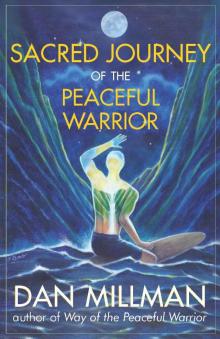 SACRED JOURNEY OF THE PEACEFUL WARRIOR
SACRED JOURNEY OF THE PEACEFUL WARRIOR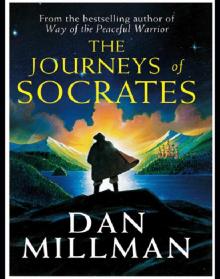 The Journeys of Socrates: An Adventure
The Journeys of Socrates: An Adventure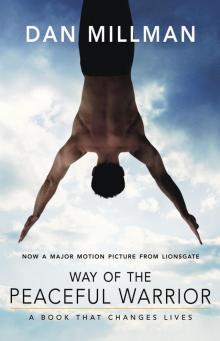 WAY OF THE PEACEFUL WARRIOR: A Book That Changes Lives
WAY OF THE PEACEFUL WARRIOR: A Book That Changes Lives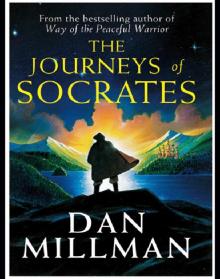 The Journeys of Socrates
The Journeys of Socrates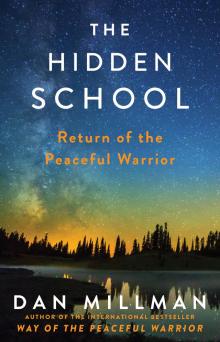 The Hidden School
The Hidden School